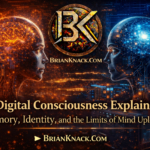Digital Consciousness Explained: Memory, Identity, and the Limits of Digital Consciousness The idea sounds irresistible. If we can map the brain, record its contents, and store that information somewhere durable, then maybe we can cheat death. Maybe memory is all we really are, and identity is just data waiting to be preserved. Imagine humanity reduced to digital consciousness seeking immortality in a digital heaven. This is the promise behind digital consciousness, and it shows up … [Read more...] about Digital Consciousness Explained: Memory, Identity, and the Limits of Mind Uploading
Artificial Intelligence Isn’t the Villain. Human Convenience Is.
Artificial Intelligence Isn’t the Villain. Human Convenience Is. Why the real danger of artificial intelligence isn’t rebellion, but surrender. Every generation has its monsters. For ours, that monster wears a clean interface and promises to make life easier. We’ve wrapped our anxieties, hopes, and fears around artificial intelligence, treating it like a ticking bomb waiting to wake up, turn hostile, and overthrow humanity. That story makes for great movies. It also misses the real threat … [Read more...] about Artificial Intelligence Isn’t the Villain. Human Convenience Is.


